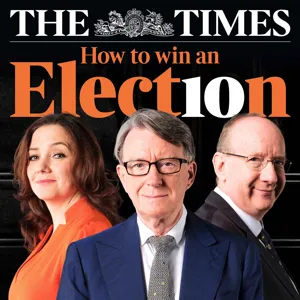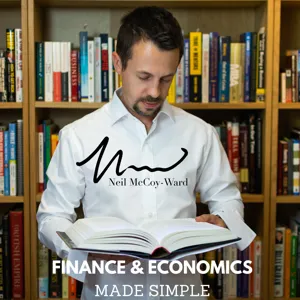Podcast Summary
PlushCare offers weight loss solutions with certified physicians and FDA-approved medications: PlushCare offers convenient access to certified physicians and FDA-approved medications for weight loss, including Wegovy and Zepbound.
PlushCare provides a convenient and effective solution for individuals looking to start their weight loss journey with the help of certified physicians and FDA-approved medications like Wegovy and Zepbound. Meanwhile, in other news, Liz Truss's leadership was called into question during her tenure as prime minister, with Dan Finkelstein sharing a scathing review of her book and recalling their once amicable relationship turning sour after she blocked him on Twitter. During their time in office, Truss and Nick Clegg clashed over childcare ratios, with Truss asserting her authority and refusing to compromise, ultimately leading to no reforms being made.
Liz Truss's premiership could have had lasting consequences for the Conservative Party: Her handling of the economy and the perception of Tory prudence were damaged, potentially impacting the party's ability to convince voters of its fiscal responsibility and economic management skills.
Learning from the discussion about Liz Truss and her book "10 Years to Save the West" is that her premiership, had she been elected instead of Rishi Sunak, could have had significant long-term consequences for the Conservative Party. According to the panel, her handling of the economy and the perception of Conservative Party's prudence with public money were damaged during her brief tenure. This, in turn, could have affected the party's ability to convince voters of its fiscal responsibility and its capacity to manage the economy effectively. The panel also suggested that the damage could be comparable to past political disasters such as Dennis Healey's infamous "the budget is empty" comment or the "winter of discontent." Despite the potential long-term impact, it's likely that the Labour Party would not be discussing Truss's premiership as much as she will be, as she continues to promote her book and her political views.
Conservative Party's Election Chances Hurt by Liz Truss: The Conservative Party's election chances are being hurt by Liz Truss' constant criticism and Sunak's perceived weakness. The party faces an ideological battle and must distinguish Sunak from previous leaders to regain public trust.
The Conservative Party's election chances are being negatively impacted by the presence of Liz Truss and her constant criticism of Rishi Sunak. Sunak's inability to assert his authority over her, despite defeating her in the leadership race, has left him appearing weak to the public. The Conservative Party is currently facing an ideological battle similar to what Labour experienced in the 1970s and 1980s, with some believing the party needs to be more left-wing and others more right-wing. Sunak's decision to focus on governing the party rather than the country may have been a mistake, as it has not effectively distinguished him from previous leaders Boris Johnson and Liz Truss, who both faced issues of integrity and economic mismanagement. The Conservative Party's fundamental problem is its departure from traditional conservatism, as exemplified by the magical thinking and unrealistic promises of Truss and Johnson. Sunak may have had a better chance of distancing himself from Johnson if Truss had not been the intermediate leader. Ultimately, the Conservative Party must address its ideological divide and provide a convincing analysis of why Sunak is different from his predecessors to regain public trust.
The Conservative Party's fixation on outdated ideologies: The Conservative Party's obsession with outdated economic theories and tax cuts, exemplified by Liz Truss' failed premiership, has hindered their ability to lead effectively and damaged their reputation.
The Conservative Party's fixation on outdated ideologies, specifically the Laffer Curve and tax cuts leading to economic growth, has hindered their ability to produce effective leadership. This was exemplified in the failed premiership of Liz Truss, who was selected due to this party mentality. Her tenure damaged the reputation of these policies, making it harder for future conservative leaders to implement them. Additionally, Truss and her wing of the party seem to benefit from electoral defeats, as they can blame the loss on the party's failure to adopt their ideas, creating a self-fulfilling prophecy. Ultimately, the Conservative Party's refusal to adapt to reality and focus on the present has hindered their ability to govern effectively.
Understanding Liz Truss' connection to libertarian ideas and her struggle to find a constituency: Despite Liz Truss' commitment to libertarian principles, her appeal to UK voters is unclear due to the success of Boris Johnson's pro-Brexit and pro-people campaign in 2019. The definition of libertarianism varies, and her low public approval rating adds uncertainty to her political future.
Liz Truss' objective as a politician is deeply connected to her libertarian ideas. However, it is unclear who the constituency of voters in the UK is that aligns with her small-state, anti-government ideology. Boris Johnson's success in the 2019 election was not based on libertarian principles but rather on his promise to deliver Brexit and be a government that was on the side of the people, particularly those in the Red Wall areas who felt abandoned by Labour. The Leave campaign was able to unite anti-immigrant nationalist libertarians and socialists, despite the apparent inconsistency between their views. It's essential to define what we mean by libertarian, as some people may associate it with getting the government off their backs, shrinking the state, and cutting taxes. However, others may want more protection and a government that represents their interests. According to a YouGov survey, only 10% of people have a positive view of Liz Truss, which is the same number as those who have a positive view of North Korea. The upcoming local and general elections will be crucial in determining if Liz Truss can connect with any members of the public and gain their support.
Managing Expectations in Politics and Business: Effective communication and expectation management are vital in politics and business. Companies can adapt to economic conditions while maintaining customer trust, while politicians must prevent overconfidence and maintain focus.
Effective communication and expectation management are crucial in political campaigns. Ryan Reynolds discussed Mint Mobile's price reduction strategy, demonstrating how companies can adapt to economic conditions while managing customer expectations. Meanwhile, in the political sphere, managing expectations, particularly when one party appears to be significantly ahead, is essential to prevent overconfidence and maintain focus. Regarding the specific question from Adrian, it's unlikely that the monarch would refuse a prime minister's request for a general election. Instead, political parties must focus on managing their internal and external expectations to ensure a successful campaign.
Setting expectations in politics: Political parties use expectation management to influence perceptions of election results, shaping public opinion and media reporting. This tactic can involve manipulation and potential misinformation.
Expectation management plays a crucial role in politics. Party strategists often set expectations to influence perceptions of the election results. This tactic, known as expectation management, can significantly impact public opinion and media reporting. For instance, during the 1997 UK general election, Philip Gould delivered a shocking revelation about Labour's shrinking lead, urging the team to reconnect with voters and avoid complacency. Similarly, in 1990, Ken Baker, the Conservative Party chairman, manipulated expectations by predicting a terrible performance in local elections but then retaining key boroughs like Wandsworth and Westminster, surprising everyone. This strategy is not new and is employed by all major parties to shape the narrative around election outcomes. However, it's important to note that while expectation management can be effective, it also involves a degree of manipulation and potential misinformation.
Manipulating voter expectations in politics: Effective expectation management in politics can impact internal motivations and party morale, but may not accurately reflect public opinion or election results.
While expectation management in politics can significantly impact internal motivations and reporting within political parties, it may not accurately reflect public opinion or voter turnout. An example of effective expectation management was seen in the 2015 UK general election, where David Cameron successfully manipulated voters' expectations of a potential Labour victory, leading to a Conservative Party advertisement that negatively portrayed Ed Miliband and the SNP. However, it's important to note that this manipulation did not influence the actual election outcome, but rather the mood and motivation of political parties and their supporters. Ultimately, the sense of a foregone conclusion in elections can lead to lower voter turnout, making close elections more significant indicators of public opinion.
The impact of expectation management on elections is not always straightforward: Expectation management can influence public perception, but its impact on votes is limited, and the distinction between political noise and signal is crucial.
Expectation management plays a significant role in elections, but its impact may not be as straightforward as it seems. During the 2010 UK general election, the Conservative Party, led by David Cameron, failed to secure a majority as expected due to the likelihood of a Labour-SNP coalition. Nick Clegg's Liberal Democrats gained attention during debates, and the media's reporting and MPs' reactions influenced public perception. The distinction between political noise and signal is crucial, and the British Election Study suggests that expectation management has limited impact on votes. However, if a party, like Labour, has a massive lead, they may face increased scrutiny, and narrowing leads can lead to negative stories and potential losses. Keir Starmer, the current Labour leader, should be cautious about drawing incorrect conclusions from past elections and understand that voter intentions are complex.
Belief in Labour's ability to win with Corbyn's socialist agenda: The lack of scrutiny during the 2017 election and Corbyn's perceived moderation led Labour to believe they could win, but his divisive politics and lack of clarity on policies likely made it unlikely for him to win in 2024
The lack of scrutiny on Jeremy Corbyn during the 2017 election, coupled with his perceived moderation during debates, contributed to the Labour Party's belief that they could win with a socialist agenda. However, after Corbyn's shift beyond 2017, his unpopularity grew, and it is unlikely that he would have won a general election in 2024 due to his divisive politics and lack of clarity on his policies. The relative popularity of Boris Johnson, even at his peak, compared to Corbyn, and the growing realization among Corbyn's supporters of the true nature of his politics, would have made it increasingly difficult for him to win. The counterfactual is difficult to fully explore, but given the political climate and Corbyn's stance, it is doubtful that he would have been successful.
Labour Party's Election Strategy: Debate over Radical Change or Safety First: The Labour Party's election outcome will spark debate on whether Keir Starmer's 'safety first' approach was necessary for victory or if a more radical agenda could have secured a larger mandate.
Keir Starmer's decision to run a "safety first" election campaign for the Labour Party, rather than pursuing a more radical or transformative agenda, will be a subject of debate both within and outside the party, regardless of the size of his victory in the upcoming election. This was highlighted during the discussion about what the consequences would have been if Jeremy Corbyn, known for his hostile stance towards Israel and associations with anti-Semitic individuals, had been the party leader during the Iran crisis. The aftermath of the election is expected to see two competing narratives: one arguing that Starmer missed an opportunity to secure a larger mandate for radical change, and the other contending that his more moderate approach was necessary to win. It remains to be seen whether Starmer himself believes he could have been more radical and still secured a majority.





